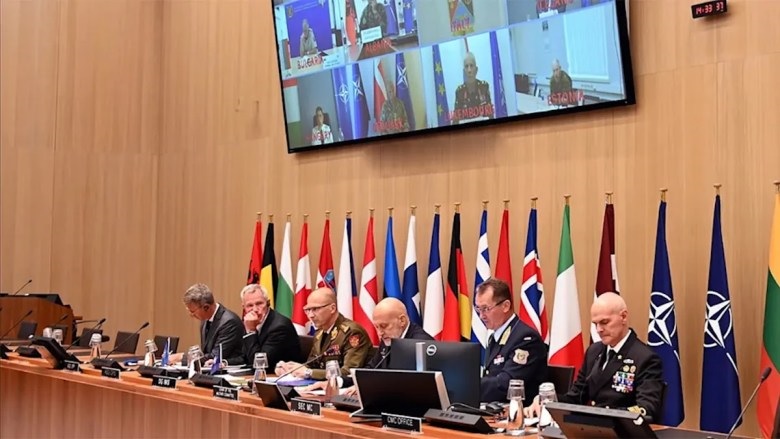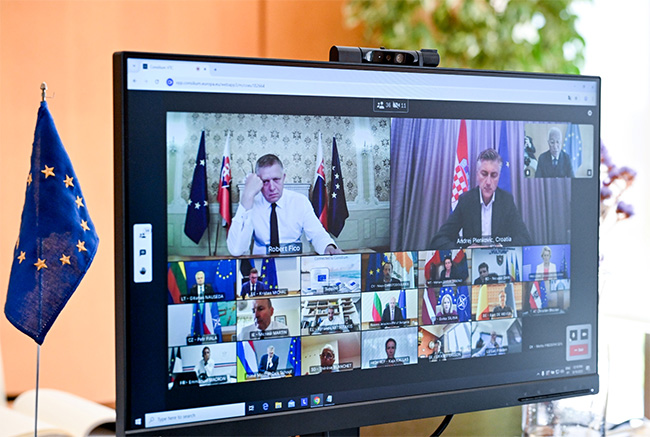 NATO “virtual” meeting.
NATO “virtual” meeting.
Photo: NATO
The Trump administration made a massive political blunder on August 20th in its pursuit of a peace deal between Russia and Ukraine. The blunder centered on a "virtual" meeting led by NATO.
Prior to that meeting, Trump had promised the Russians that any deal would rule out Ukraine's NATO membership. Apparently the Russians read Trump's assurance to include no NATO peacekeepers.
That was a mistake. The administration did not consult with the Russians ahead of the NATO parlay, stresses Stephen Bryen, a former U.S. Deputy Under Secretary of Defense.
The NATO-led meeting was intended to lay out military options to meet Ukraine's request for security guarantees. The discussion apparently considered different views on what a security guarantee would actually look like: would it, for example, include troops and if so, how many, where would they be based in Ukraine and what role would they perform? Stories are around that some countries, the British and French in one version, the British, Germans and Poles in another (unlikely option), would actually put boots on the ground in Ukraine, although British sources insist that its troops would not be on the front line but "far back" from the action.
President Trump says that the US won't send any troops, but will support a security guarantee for Ukraine with US aircraft, presumably mainly spy aircraft (which anyway the US is regularly doing). But President Trump has also touted US air superiority against Russia, suggesting that the US air patrols might well include fighter aircraft such as the F-35. Would these aircraft operate from Ukrainian soil or from bases in Poland and Romania, for example?
The virtual meeting included the defense chiefs from all 32 NATO member countries. The meeting was overseen by Italian Admiral Giuseppe Cavo Dragone, the chair of NATO's Military Committee.
The new Supreme Allied Commander Europe (SACEUR) and leader of U.S. European Command, U.S. General Alexus Grynkewich, delivered his first briefing to the virtual meeting. Also attending was General Dan Caine who is Chairman of the US Joint Chiefs of Staff.
Russia's reaction came quickly and rejected foreign participation in security guarantees for Ukraine. Speaking about the possibility of foreign troops being deployed on Ukrainian territory, Russian foreign minister Sergey Lavrov said that Moscow has always viewed this as unacceptable. "And I hope they understand that this would be absolutely unacceptable for Russia and for all sensible political forces in Europe," Lavrov said." He went on to say that such proposals are a "road to nowhere."
It is hard to be sure what led the Trump administration to believe that the Russians would accept NATO states providing security for Ukraine. The very high level of US participation under the NATO banner creates a significant roadblock to a deal on Ukraine.
There also is emerging pushback on any peace deal that involves Ukraine surrendering all or part of Donbas. In a story on August 21st, the conservative ‘The Washington Times’ in a front-page story (print edition) suggesting any deal was dangerous. "The ugly truth behind any deal that would cede a chunk of Ukraine’s Donbas region to Moscow is that it could immediately strengthen the Russian military, providing a major win for one of America’s leading adversaries in an era of great power competition.
"In such a scenario, Ukraine would lose some of its most heavily fortified defensive positions. Russian President Vladimir Putin’s generals would seek to deepen their substantial footprint in the strategically vital theater with new military bases. The Russian navy could gain even greater control over the Black Sea. The Russian government and its armed forces could take de facto ownership of the significant mineral deposits underground in eastern Ukraine."
‘The Washington Times’ story goes on to quote a number of think tanks including the Institute for the ‘Study of War’ which has been strongly pro-Ukraine for some time.
While the diplomatic process continues, problems are mounting for Trump's peace initiative for Ukraine.
 EU leaders meet for a virtual summit after White House talks on Ukraine. Photo: Euroactiv
EU leaders meet for a virtual summit after White House talks on Ukraine. Photo: Euroactiv
European countries are inching towards a framework of Western security guarantees for Kyiv after Donald Trump hinted at a US "presence" in Ukraine, even as the details remain unclear, Euractiv writes.
Monday's White House summit between Trump, Volodymyr Zelenskyy and six European leaders produced a clearer – if still tentative – US commitment to support Ukraine’s security.
A day later, EU27 leaders, and separately members of the 'Coalition of the Willing', were briefed via videoconference on the talks in Washington.
"Now is the time to accelerate our practical work to put in place a guarantee similar to NATO's Article 5 with continued US engagement," European Council President António Costa told EU leaders in Tuesday's follow-up meeting.
Drafting a framework
European officials say that negotiators will now begin sketching a blueprint of security guarantees intended to pave the way for a possible meeting between Zelenskyy and Vladimir Putin.
National security advisers from participating countries hope to draft a skeleton framework over the next week, people familiar with the talks say, before a potential follow-up call with Trump.
A British read-out of Tuesday's Coalition of the Willing meeting separately said that "planning teams would meet with their US counterparts in the coming days to further strengthen plans to deliver robust security guarantees."
So far, a broad consensus on the security guarantees has emerged around three elements: a well-equipped and well-armed Ukrainian armed forces without size restrictions, a multinational “reassurance force” after a ceasefire, and some form of Washington backing, although the scope of American involvement remains vague.
EU leaders also voiced wide support for NATO-style commitments - "Article 5-like protections," as US officials increasingly describe them. While this is a reference to NATO's mutual defence clause, the level of protection remains largely unclear.
They also acknowledged that hammering out the details will require painstaking negotiation.
Overall, European officials privately note a subtle but telling shift in Trump’s rhetoric: from mere “coordination” of security arrangements to a “presence of the US."
Trump, speaking the morning after White House meetings on Tuesday, told Fox News that US forces could assist Ukraine’s allies in deterring future Russian attacks.
“When it comes to security, [Europeans are] willing to put people on the ground,” Trump said, adding Europe would “front load” them, including “boots on the ground.”
“We’re willing to help them with things, especially, probably talk about by air, because there’s nobody [has the] kind of stuff we have,” he added, indicating Washington could focus on air defence elements in such plans.
EU foreign and defence ministers, meeting informally in Copenhagen next week, are expected to discuss security guarantees, the bloc’s top diplomat Kaja Kallas said.
“The EU will contribute to these security guarantees, notably by the training of Ukrainian soldiers and strengthening Ukraine’s armed forces and defence industry,” she said.
Timing remains the thorniest question
Officials hope to have the framework ready before a potential Zelenskyy-Putin meeting, which could take place within two to three weeks.
In Monday’s talks at the White House, several European leaders made the pitch to the US side that any Russian refusal to attend such a meeting – or any failure to make progress – should trigger the next round of sanctions.
"Whether we call it a ceasefire or a truce is secondary; what matters is that we maintain pressure through sanctions if Russia does not comply," Costa told EU leaders.
The European Commission says the next package of measures against Moscow – the nineteenth – could be ready by early September, if required.
…Europe really wants to send troops to Ukraine. NATO, as we can see, develops plans for intervention.
If this happens, Western troops will become a legitimate target for the Russian Armed Forces, which Moscow has repeated more than once: The presence of foreign troops in Ukraine is unacceptable for Russia!
Moreover, Europe itself may find itself under attack. Does Europe really need it?
read more in our Telegram-channel https://t.me/The_International_Affairs

 9:44 24.08.2025 •
9:44 24.08.2025 •






















